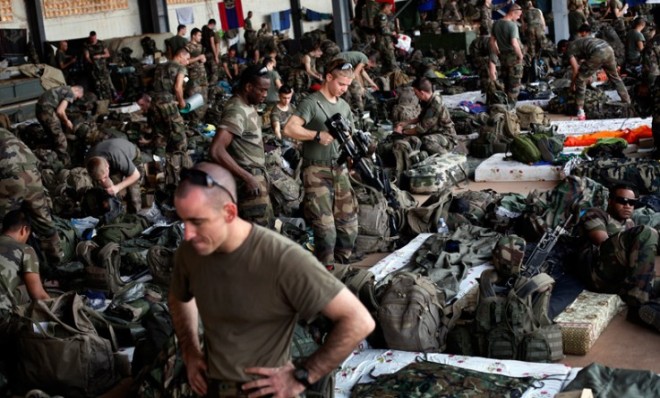Should the U.S. do more to help France fight Mali's Islamists?
The Pentagon has agreed only to give France intelligence and logistical support


A free daily email with the biggest news stories of the day – and the best features from TheWeek.com
You are now subscribed
Your newsletter sign-up was successful
Pentagon officials say the U.S. is preparing to provide logistical support to France as it employs airstrikes to halt the advance of al-Qaeda-linked Islamist rebels who have taken over northern Mali. The U.S. military is already sharing intelligence gathered by its drones flying in the region. France has sent in 750 troops and plans to deploy 1,000 more, but U.S. Defense Secretary Leon Panetta has ruled out sending American ground troops. Is there something more the U.S. should be doing to help make sure the Islamists don't overrun the West African nation's military?
The U.S. has to get more deeply involved: The U.S. has kept Mali at arm's length, says The New York Times in an editorial, since its military overthrew of President Amadou Toumani Touré last March. But "this is no time to walk away." Supporting France's airstrikes makes sense, but the U.S. should also revive and strengthen its efforts to train Mali's army, "with greater emphasis on human rights and civilian supremacy." Ultimately it's up to Mali to put down the Islamist rebels.
The Week
Escape your echo chamber. Get the facts behind the news, plus analysis from multiple perspectives.

Sign up for The Week's Free Newsletters
From our morning news briefing to a weekly Good News Newsletter, get the best of The Week delivered directly to your inbox.
From our morning news briefing to a weekly Good News Newsletter, get the best of The Week delivered directly to your inbox.
No. If the U.S. wants to help, it should butt out: Our meddling helped create this mess, says Glenn Greenwald at Britain's Guardian. A Malian officer we trained led the coup against the elected government, and that opened the door to the Islamist takeover in the north, which was also fueled by battle-hardened militants returning from Libya. Joining a battle against another Muslim foe will only wind up "sowing the seeds of further intervention."
"The bombing of Mali highlights all the lessons of western intervention"
We have to come up with a strategy that works: President Obama's plan to help North African countries defeat terrorists has "failed catastrophically," says Walter Russell Mead at The American Interest, but giving up isn't much of an option. "Weak states like Mali are the new front line" in the terror war. As long as the enemy keeps popping up in these places, U.S. leaders will have to "learn from experience" and devise "workable strategies" to win this dangerous new "global game of whack-a-mole."
"NYT calls U.S. anti-terror strategy in North Africa a catastrophe"
A free daily email with the biggest news stories of the day – and the best features from TheWeek.com
Harold Maass is a contributing editor at The Week. He has been writing for The Week since the 2001 debut of the U.S. print edition and served as editor of TheWeek.com when it launched in 2008. Harold started his career as a newspaper reporter in South Florida and Haiti. He has previously worked for a variety of news outlets, including The Miami Herald, ABC News and Fox News, and for several years wrote a daily roundup of financial news for The Week and Yahoo Finance.
-
 Will increasing tensions with Iran boil over into war?
Will increasing tensions with Iran boil over into war?Today’s Big Question President Donald Trump has recently been threatening the country
-
 Corruption: The spy sheikh and the president
Corruption: The spy sheikh and the presidentFeature Trump is at the center of another scandal
-
 Putin’s shadow war
Putin’s shadow warFeature The Kremlin is waging a campaign of sabotage and subversion against Ukraine’s allies in the West
